Report on Entrepreneurship and Small Business Management: Analysis
VerifiedAdded on 2020/10/04
|22
|6766
|174
Report
AI Summary
This report delves into the multifaceted world of entrepreneurship and small business management. It begins by defining entrepreneurial ventures, exploring their relationship with different typologies such as scalable start-ups, social ventures, small-scale ventures, and large-scale ventures. The report then contrasts and compares these ventures, highlighting their similarities and differences. The impact of micro and small businesses on the economy is examined, followed by an analysis of how SMEs and business start-ups have been affected by Brexit and their role in social and economic growth. The report also includes an analysis of two successful entrepreneurs, focusing on their traits and proficiencies, and assesses the influence of entrepreneurial personality and background on motivation and mind-set. The report also touches upon the facts of entrepreneurship in the public sector and the development and growth of entrepreneurial ventures. This report provides a comprehensive overview of key concepts in entrepreneurship and their practical implications.

Entrepreneurship and Small
Business Management
Business Management
Paraphrase This Document
Need a fresh take? Get an instant paraphrase of this document with our AI Paraphraser
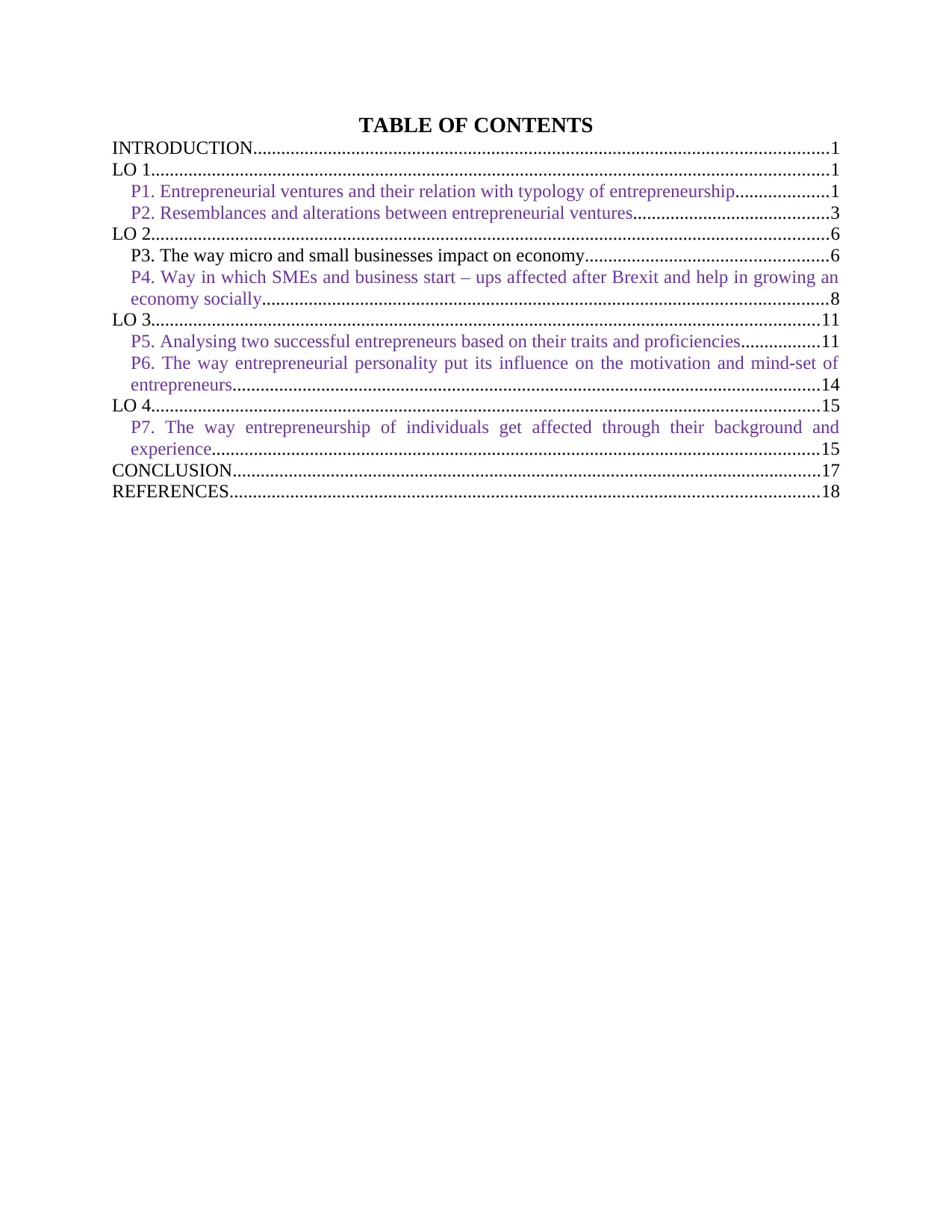
TABLE OF CONTENTS
INTRODUCTION...........................................................................................................................1
LO 1.................................................................................................................................................1
P1. Entrepreneurial ventures and their relation with typology of entrepreneurship....................1
P2. Resemblances and alterations between entrepreneurial ventures..........................................3
LO 2.................................................................................................................................................6
P3. The way micro and small businesses impact on economy....................................................6
P4. Way in which SMEs and business start – ups affected after Brexit and help in growing an
economy socially.........................................................................................................................8
LO 3...............................................................................................................................................11
P5. Analysing two successful entrepreneurs based on their traits and proficiencies.................11
P6. The way entrepreneurial personality put its influence on the motivation and mind-set of
entrepreneurs..............................................................................................................................14
LO 4...............................................................................................................................................15
P7. The way entrepreneurship of individuals get affected through their background and
experience..................................................................................................................................15
CONCLUSION..............................................................................................................................17
REFERENCES..............................................................................................................................18
INTRODUCTION...........................................................................................................................1
LO 1.................................................................................................................................................1
P1. Entrepreneurial ventures and their relation with typology of entrepreneurship....................1
P2. Resemblances and alterations between entrepreneurial ventures..........................................3
LO 2.................................................................................................................................................6
P3. The way micro and small businesses impact on economy....................................................6
P4. Way in which SMEs and business start – ups affected after Brexit and help in growing an
economy socially.........................................................................................................................8
LO 3...............................................................................................................................................11
P5. Analysing two successful entrepreneurs based on their traits and proficiencies.................11
P6. The way entrepreneurial personality put its influence on the motivation and mind-set of
entrepreneurs..............................................................................................................................14
LO 4...............................................................................................................................................15
P7. The way entrepreneurship of individuals get affected through their background and
experience..................................................................................................................................15
CONCLUSION..............................................................................................................................17
REFERENCES..............................................................................................................................18

LIST OF FIGURES
Figure 1: Predicted UK contributions to EU Budget.......................................................................6
Figure 2: Value added of SMEs.......................................................................................................7
Figure 3: Brexit impact on SMEs....................................................................................................9
Figure 4: Brexit impact on SMEs..................................................................................................10
Figure 1: Predicted UK contributions to EU Budget.......................................................................6
Figure 2: Value added of SMEs.......................................................................................................7
Figure 3: Brexit impact on SMEs....................................................................................................9
Figure 4: Brexit impact on SMEs..................................................................................................10
⊘ This is a preview!⊘
Do you want full access?
Subscribe today to unlock all pages.

Trusted by 1+ million students worldwide
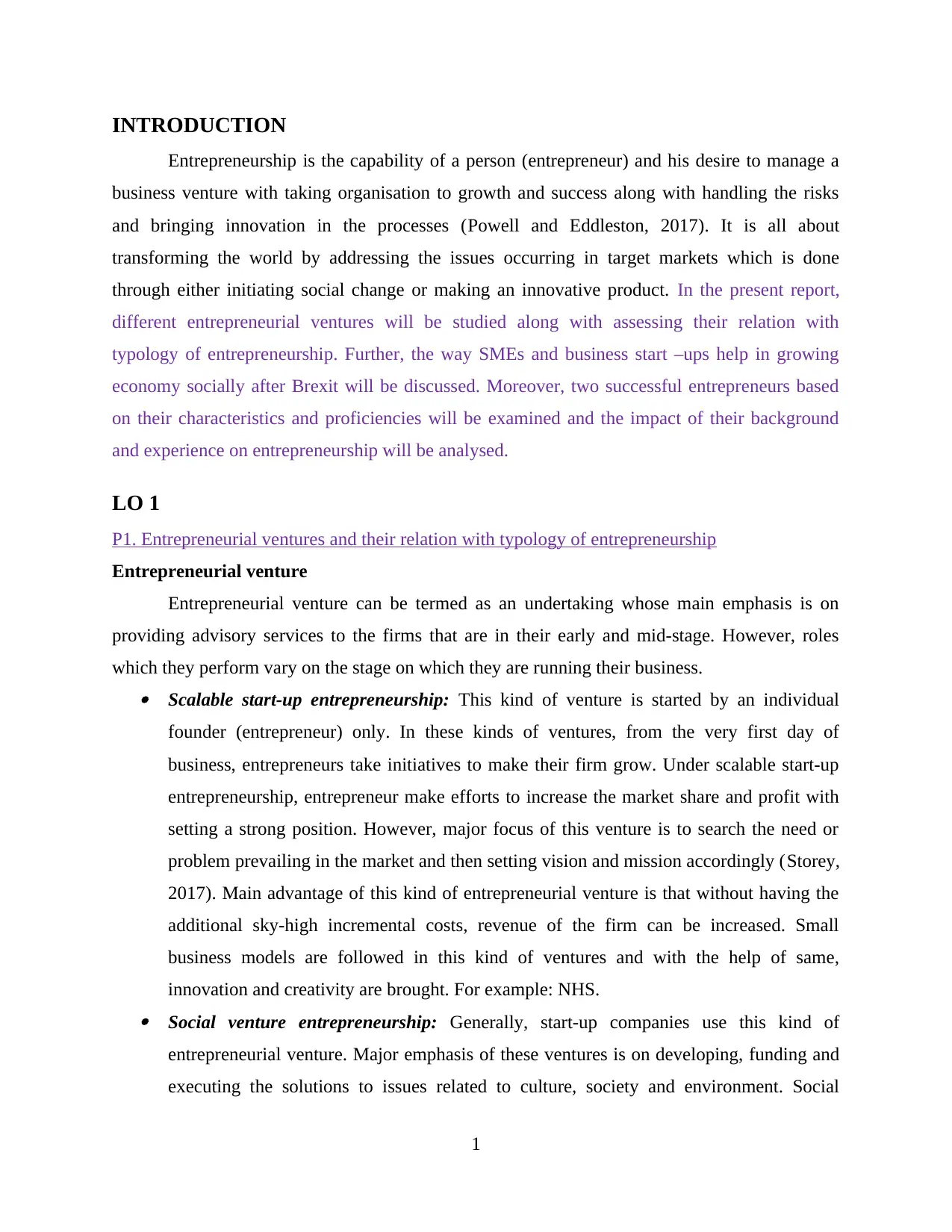
INTRODUCTION
Entrepreneurship is the capability of a person (entrepreneur) and his desire to manage a
business venture with taking organisation to growth and success along with handling the risks
and bringing innovation in the processes (Powell and Eddleston, 2017). It is all about
transforming the world by addressing the issues occurring in target markets which is done
through either initiating social change or making an innovative product. In the present report,
different entrepreneurial ventures will be studied along with assessing their relation with
typology of entrepreneurship. Further, the way SMEs and business start –ups help in growing
economy socially after Brexit will be discussed. Moreover, two successful entrepreneurs based
on their characteristics and proficiencies will be examined and the impact of their background
and experience on entrepreneurship will be analysed.
LO 1
P1. Entrepreneurial ventures and their relation with typology of entrepreneurship
Entrepreneurial venture
Entrepreneurial venture can be termed as an undertaking whose main emphasis is on
providing advisory services to the firms that are in their early and mid-stage. However, roles
which they perform vary on the stage on which they are running their business. Scalable start-up entrepreneurship: This kind of venture is started by an individual
founder (entrepreneur) only. In these kinds of ventures, from the very first day of
business, entrepreneurs take initiatives to make their firm grow. Under scalable start-up
entrepreneurship, entrepreneur make efforts to increase the market share and profit with
setting a strong position. However, major focus of this venture is to search the need or
problem prevailing in the market and then setting vision and mission accordingly (Storey,
2017). Main advantage of this kind of entrepreneurial venture is that without having the
additional sky-high incremental costs, revenue of the firm can be increased. Small
business models are followed in this kind of ventures and with the help of same,
innovation and creativity are brought. For example: NHS. Social venture entrepreneurship: Generally, start-up companies use this kind of
entrepreneurial venture. Major emphasis of these ventures is on developing, funding and
executing the solutions to issues related to culture, society and environment. Social
1
Entrepreneurship is the capability of a person (entrepreneur) and his desire to manage a
business venture with taking organisation to growth and success along with handling the risks
and bringing innovation in the processes (Powell and Eddleston, 2017). It is all about
transforming the world by addressing the issues occurring in target markets which is done
through either initiating social change or making an innovative product. In the present report,
different entrepreneurial ventures will be studied along with assessing their relation with
typology of entrepreneurship. Further, the way SMEs and business start –ups help in growing
economy socially after Brexit will be discussed. Moreover, two successful entrepreneurs based
on their characteristics and proficiencies will be examined and the impact of their background
and experience on entrepreneurship will be analysed.
LO 1
P1. Entrepreneurial ventures and their relation with typology of entrepreneurship
Entrepreneurial venture
Entrepreneurial venture can be termed as an undertaking whose main emphasis is on
providing advisory services to the firms that are in their early and mid-stage. However, roles
which they perform vary on the stage on which they are running their business. Scalable start-up entrepreneurship: This kind of venture is started by an individual
founder (entrepreneur) only. In these kinds of ventures, from the very first day of
business, entrepreneurs take initiatives to make their firm grow. Under scalable start-up
entrepreneurship, entrepreneur make efforts to increase the market share and profit with
setting a strong position. However, major focus of this venture is to search the need or
problem prevailing in the market and then setting vision and mission accordingly (Storey,
2017). Main advantage of this kind of entrepreneurial venture is that without having the
additional sky-high incremental costs, revenue of the firm can be increased. Small
business models are followed in this kind of ventures and with the help of same,
innovation and creativity are brought. For example: NHS. Social venture entrepreneurship: Generally, start-up companies use this kind of
entrepreneurial venture. Major emphasis of these ventures is on developing, funding and
executing the solutions to issues related to culture, society and environment. Social
1
Paraphrase This Document
Need a fresh take? Get an instant paraphrase of this document with our AI Paraphraser
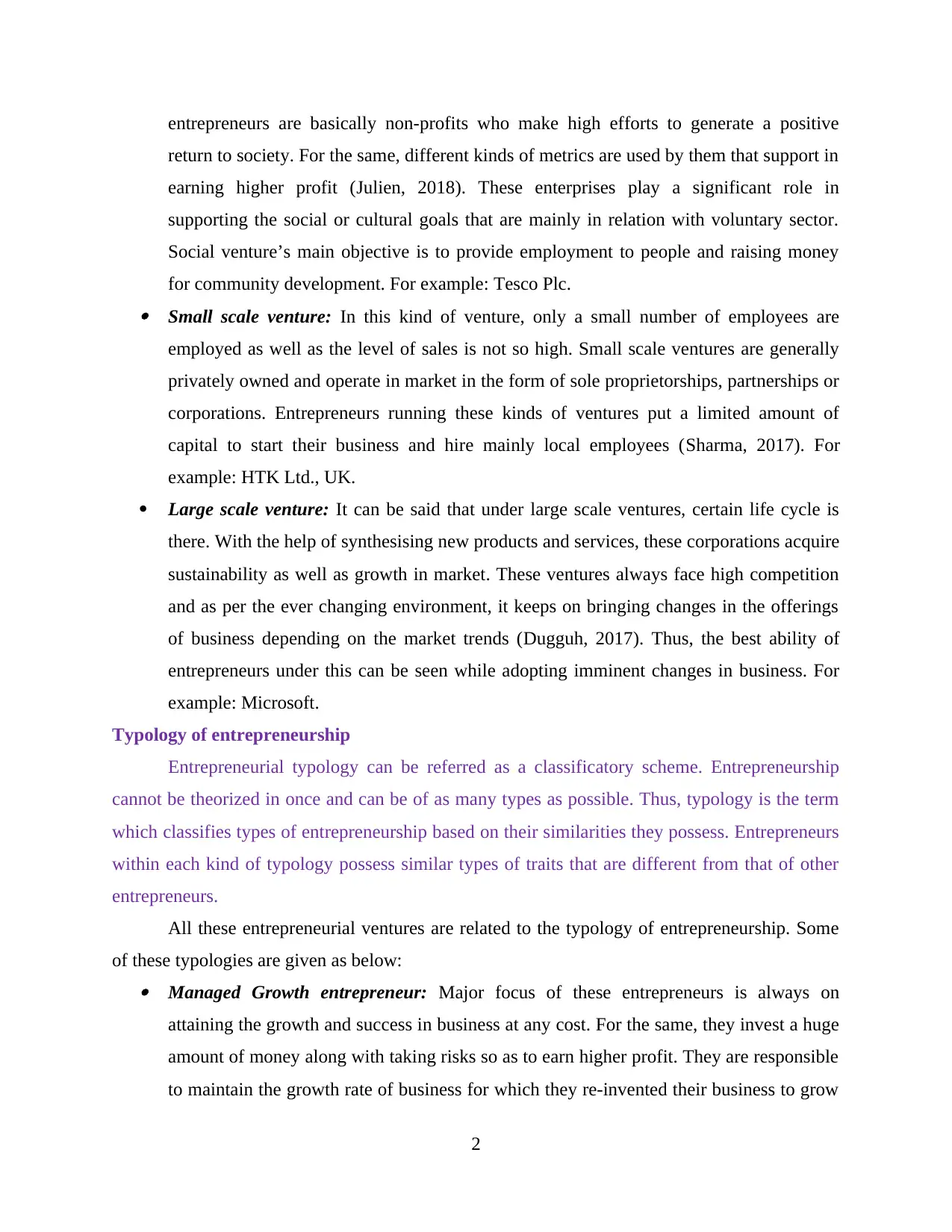
entrepreneurs are basically non-profits who make high efforts to generate a positive
return to society. For the same, different kinds of metrics are used by them that support in
earning higher profit (Julien, 2018). These enterprises play a significant role in
supporting the social or cultural goals that are mainly in relation with voluntary sector.
Social venture’s main objective is to provide employment to people and raising money
for community development. For example: Tesco Plc. Small scale venture: In this kind of venture, only a small number of employees are
employed as well as the level of sales is not so high. Small scale ventures are generally
privately owned and operate in market in the form of sole proprietorships, partnerships or
corporations. Entrepreneurs running these kinds of ventures put a limited amount of
capital to start their business and hire mainly local employees (Sharma, 2017). For
example: HTK Ltd., UK.
Large scale venture: It can be said that under large scale ventures, certain life cycle is
there. With the help of synthesising new products and services, these corporations acquire
sustainability as well as growth in market. These ventures always face high competition
and as per the ever changing environment, it keeps on bringing changes in the offerings
of business depending on the market trends (Dugguh, 2017). Thus, the best ability of
entrepreneurs under this can be seen while adopting imminent changes in business. For
example: Microsoft.
Typology of entrepreneurship
Entrepreneurial typology can be referred as a classificatory scheme. Entrepreneurship
cannot be theorized in once and can be of as many types as possible. Thus, typology is the term
which classifies types of entrepreneurship based on their similarities they possess. Entrepreneurs
within each kind of typology possess similar types of traits that are different from that of other
entrepreneurs.
All these entrepreneurial ventures are related to the typology of entrepreneurship. Some
of these typologies are given as below: Managed Growth entrepreneur: Major focus of these entrepreneurs is always on
attaining the growth and success in business at any cost. For the same, they invest a huge
amount of money along with taking risks so as to earn higher profit. They are responsible
to maintain the growth rate of business for which they re-invented their business to grow
2
return to society. For the same, different kinds of metrics are used by them that support in
earning higher profit (Julien, 2018). These enterprises play a significant role in
supporting the social or cultural goals that are mainly in relation with voluntary sector.
Social venture’s main objective is to provide employment to people and raising money
for community development. For example: Tesco Plc. Small scale venture: In this kind of venture, only a small number of employees are
employed as well as the level of sales is not so high. Small scale ventures are generally
privately owned and operate in market in the form of sole proprietorships, partnerships or
corporations. Entrepreneurs running these kinds of ventures put a limited amount of
capital to start their business and hire mainly local employees (Sharma, 2017). For
example: HTK Ltd., UK.
Large scale venture: It can be said that under large scale ventures, certain life cycle is
there. With the help of synthesising new products and services, these corporations acquire
sustainability as well as growth in market. These ventures always face high competition
and as per the ever changing environment, it keeps on bringing changes in the offerings
of business depending on the market trends (Dugguh, 2017). Thus, the best ability of
entrepreneurs under this can be seen while adopting imminent changes in business. For
example: Microsoft.
Typology of entrepreneurship
Entrepreneurial typology can be referred as a classificatory scheme. Entrepreneurship
cannot be theorized in once and can be of as many types as possible. Thus, typology is the term
which classifies types of entrepreneurship based on their similarities they possess. Entrepreneurs
within each kind of typology possess similar types of traits that are different from that of other
entrepreneurs.
All these entrepreneurial ventures are related to the typology of entrepreneurship. Some
of these typologies are given as below: Managed Growth entrepreneur: Major focus of these entrepreneurs is always on
attaining the growth and success in business at any cost. For the same, they invest a huge
amount of money along with taking risks so as to earn higher profit. They are responsible
to maintain the growth rate of business for which they re-invented their business to grow
2
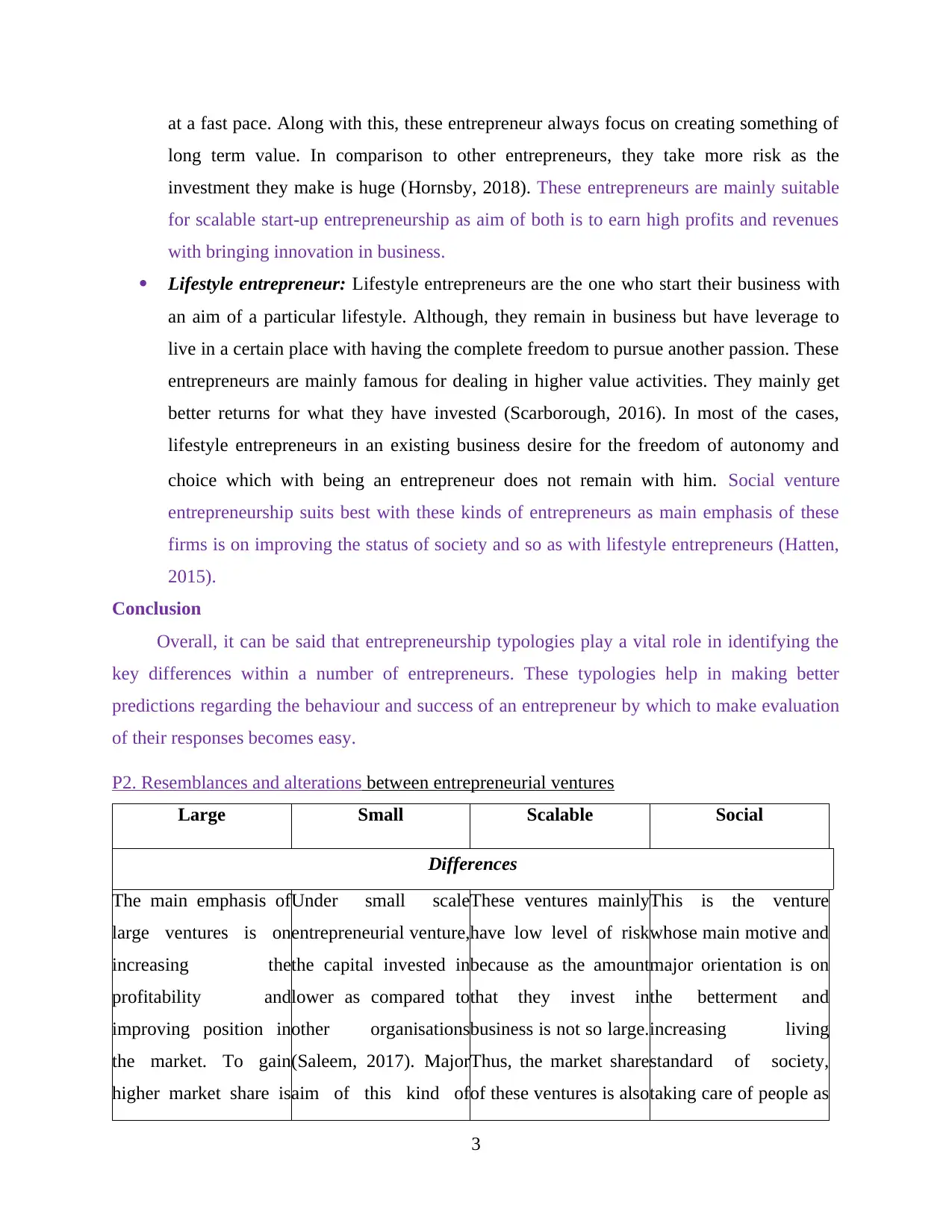
at a fast pace. Along with this, these entrepreneur always focus on creating something of
long term value. In comparison to other entrepreneurs, they take more risk as the
investment they make is huge (Hornsby, 2018). These entrepreneurs are mainly suitable
for scalable start-up entrepreneurship as aim of both is to earn high profits and revenues
with bringing innovation in business.
Lifestyle entrepreneur: Lifestyle entrepreneurs are the one who start their business with
an aim of a particular lifestyle. Although, they remain in business but have leverage to
live in a certain place with having the complete freedom to pursue another passion. These
entrepreneurs are mainly famous for dealing in higher value activities. They mainly get
better returns for what they have invested (Scarborough, 2016). In most of the cases,
lifestyle entrepreneurs in an existing business desire for the freedom of autonomy and
choice which with being an entrepreneur does not remain with him. Social venture
entrepreneurship suits best with these kinds of entrepreneurs as main emphasis of these
firms is on improving the status of society and so as with lifestyle entrepreneurs (Hatten,
2015).
Conclusion
Overall, it can be said that entrepreneurship typologies play a vital role in identifying the
key differences within a number of entrepreneurs. These typologies help in making better
predictions regarding the behaviour and success of an entrepreneur by which to make evaluation
of their responses becomes easy.
P2. Resemblances and alterations between entrepreneurial ventures
Large Small Scalable Social
Differences
The main emphasis of
large ventures is on
increasing the
profitability and
improving position in
the market. To gain
higher market share is
Under small scale
entrepreneurial venture,
the capital invested in
lower as compared to
other organisations
(Saleem, 2017). Major
aim of this kind of
These ventures mainly
have low level of risk
because as the amount
that they invest in
business is not so large.
Thus, the market share
of these ventures is also
This is the venture
whose main motive and
major orientation is on
the betterment and
increasing living
standard of society,
taking care of people as
3
long term value. In comparison to other entrepreneurs, they take more risk as the
investment they make is huge (Hornsby, 2018). These entrepreneurs are mainly suitable
for scalable start-up entrepreneurship as aim of both is to earn high profits and revenues
with bringing innovation in business.
Lifestyle entrepreneur: Lifestyle entrepreneurs are the one who start their business with
an aim of a particular lifestyle. Although, they remain in business but have leverage to
live in a certain place with having the complete freedom to pursue another passion. These
entrepreneurs are mainly famous for dealing in higher value activities. They mainly get
better returns for what they have invested (Scarborough, 2016). In most of the cases,
lifestyle entrepreneurs in an existing business desire for the freedom of autonomy and
choice which with being an entrepreneur does not remain with him. Social venture
entrepreneurship suits best with these kinds of entrepreneurs as main emphasis of these
firms is on improving the status of society and so as with lifestyle entrepreneurs (Hatten,
2015).
Conclusion
Overall, it can be said that entrepreneurship typologies play a vital role in identifying the
key differences within a number of entrepreneurs. These typologies help in making better
predictions regarding the behaviour and success of an entrepreneur by which to make evaluation
of their responses becomes easy.
P2. Resemblances and alterations between entrepreneurial ventures
Large Small Scalable Social
Differences
The main emphasis of
large ventures is on
increasing the
profitability and
improving position in
the market. To gain
higher market share is
Under small scale
entrepreneurial venture,
the capital invested in
lower as compared to
other organisations
(Saleem, 2017). Major
aim of this kind of
These ventures mainly
have low level of risk
because as the amount
that they invest in
business is not so large.
Thus, the market share
of these ventures is also
This is the venture
whose main motive and
major orientation is on
the betterment and
increasing living
standard of society,
taking care of people as
3
⊘ This is a preview!⊘
Do you want full access?
Subscribe today to unlock all pages.

Trusted by 1+ million students worldwide
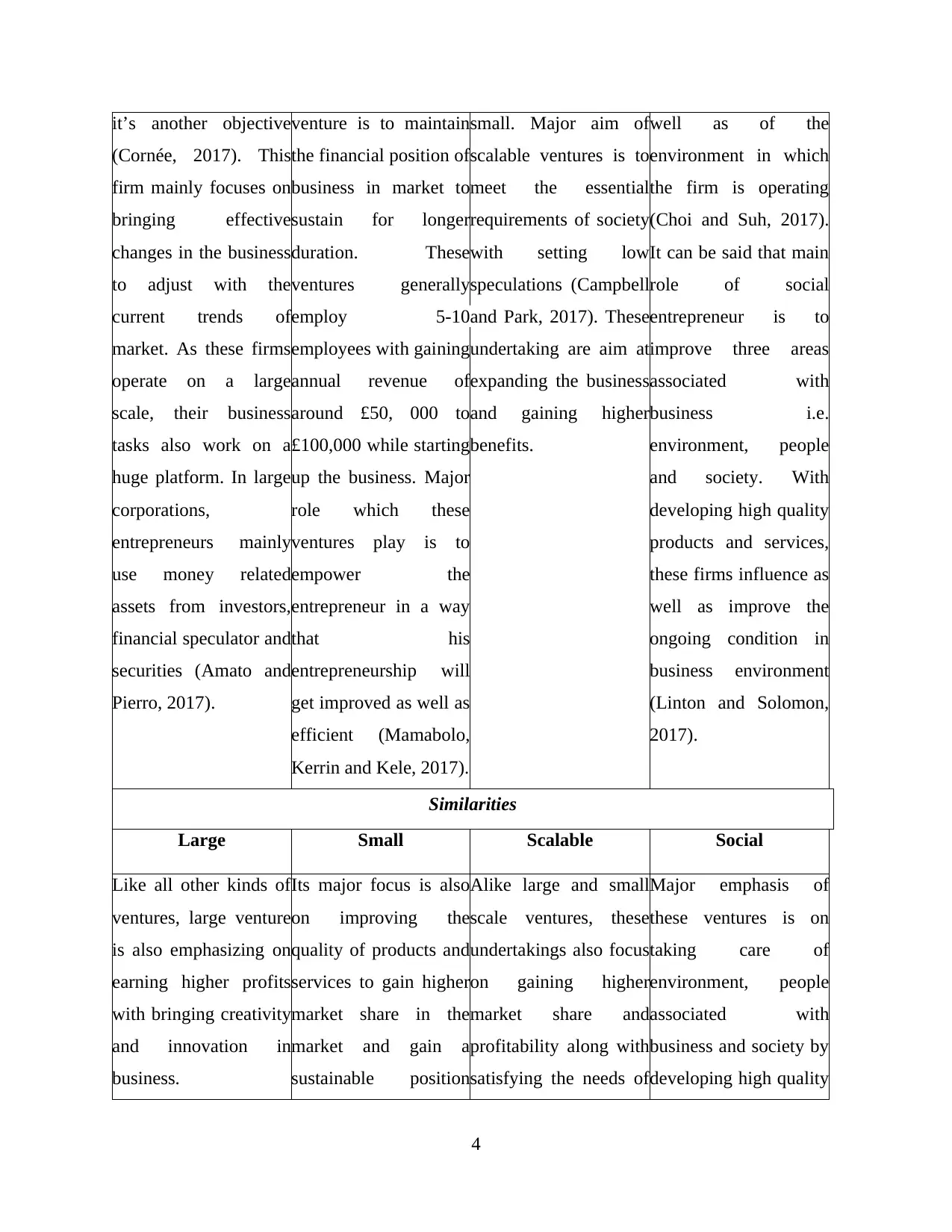
it’s another objective
(Cornée, 2017). This
firm mainly focuses on
bringing effective
changes in the business
to adjust with the
current trends of
market. As these firms
operate on a large
scale, their business
tasks also work on a
huge platform. In large
corporations,
entrepreneurs mainly
use money related
assets from investors,
financial speculator and
securities (Amato and
Pierro, 2017).
venture is to maintain
the financial position of
business in market to
sustain for longer
duration. These
ventures generally
employ 5-10
employees with gaining
annual revenue of
around £50, 000 to
£100,000 while starting
up the business. Major
role which these
ventures play is to
empower the
entrepreneur in a way
that his
entrepreneurship will
get improved as well as
efficient (Mamabolo,
Kerrin and Kele, 2017).
small. Major aim of
scalable ventures is to
meet the essential
requirements of society
with setting low
speculations (Campbell
and Park, 2017). These
undertaking are aim at
expanding the business
and gaining higher
benefits.
well as of the
environment in which
the firm is operating
(Choi and Suh, 2017).
It can be said that main
role of social
entrepreneur is to
improve three areas
associated with
business i.e.
environment, people
and society. With
developing high quality
products and services,
these firms influence as
well as improve the
ongoing condition in
business environment
(Linton and Solomon,
2017).
Similarities
Large Small Scalable Social
Like all other kinds of
ventures, large venture
is also emphasizing on
earning higher profits
with bringing creativity
and innovation in
business.
Its major focus is also
on improving the
quality of products and
services to gain higher
market share in the
market and gain a
sustainable position
Alike large and small
scale ventures, these
undertakings also focus
on gaining higher
market share and
profitability along with
satisfying the needs of
Major emphasis of
these ventures is on
taking care of
environment, people
associated with
business and society by
developing high quality
4
(Cornée, 2017). This
firm mainly focuses on
bringing effective
changes in the business
to adjust with the
current trends of
market. As these firms
operate on a large
scale, their business
tasks also work on a
huge platform. In large
corporations,
entrepreneurs mainly
use money related
assets from investors,
financial speculator and
securities (Amato and
Pierro, 2017).
venture is to maintain
the financial position of
business in market to
sustain for longer
duration. These
ventures generally
employ 5-10
employees with gaining
annual revenue of
around £50, 000 to
£100,000 while starting
up the business. Major
role which these
ventures play is to
empower the
entrepreneur in a way
that his
entrepreneurship will
get improved as well as
efficient (Mamabolo,
Kerrin and Kele, 2017).
small. Major aim of
scalable ventures is to
meet the essential
requirements of society
with setting low
speculations (Campbell
and Park, 2017). These
undertaking are aim at
expanding the business
and gaining higher
benefits.
well as of the
environment in which
the firm is operating
(Choi and Suh, 2017).
It can be said that main
role of social
entrepreneur is to
improve three areas
associated with
business i.e.
environment, people
and society. With
developing high quality
products and services,
these firms influence as
well as improve the
ongoing condition in
business environment
(Linton and Solomon,
2017).
Similarities
Large Small Scalable Social
Like all other kinds of
ventures, large venture
is also emphasizing on
earning higher profits
with bringing creativity
and innovation in
business.
Its major focus is also
on improving the
quality of products and
services to gain higher
market share in the
market and gain a
sustainable position
Alike large and small
scale ventures, these
undertakings also focus
on gaining higher
market share and
profitability along with
satisfying the needs of
Major emphasis of
these ventures is on
taking care of
environment, people
associated with
business and society by
developing high quality
4
Paraphrase This Document
Need a fresh take? Get an instant paraphrase of this document with our AI Paraphraser
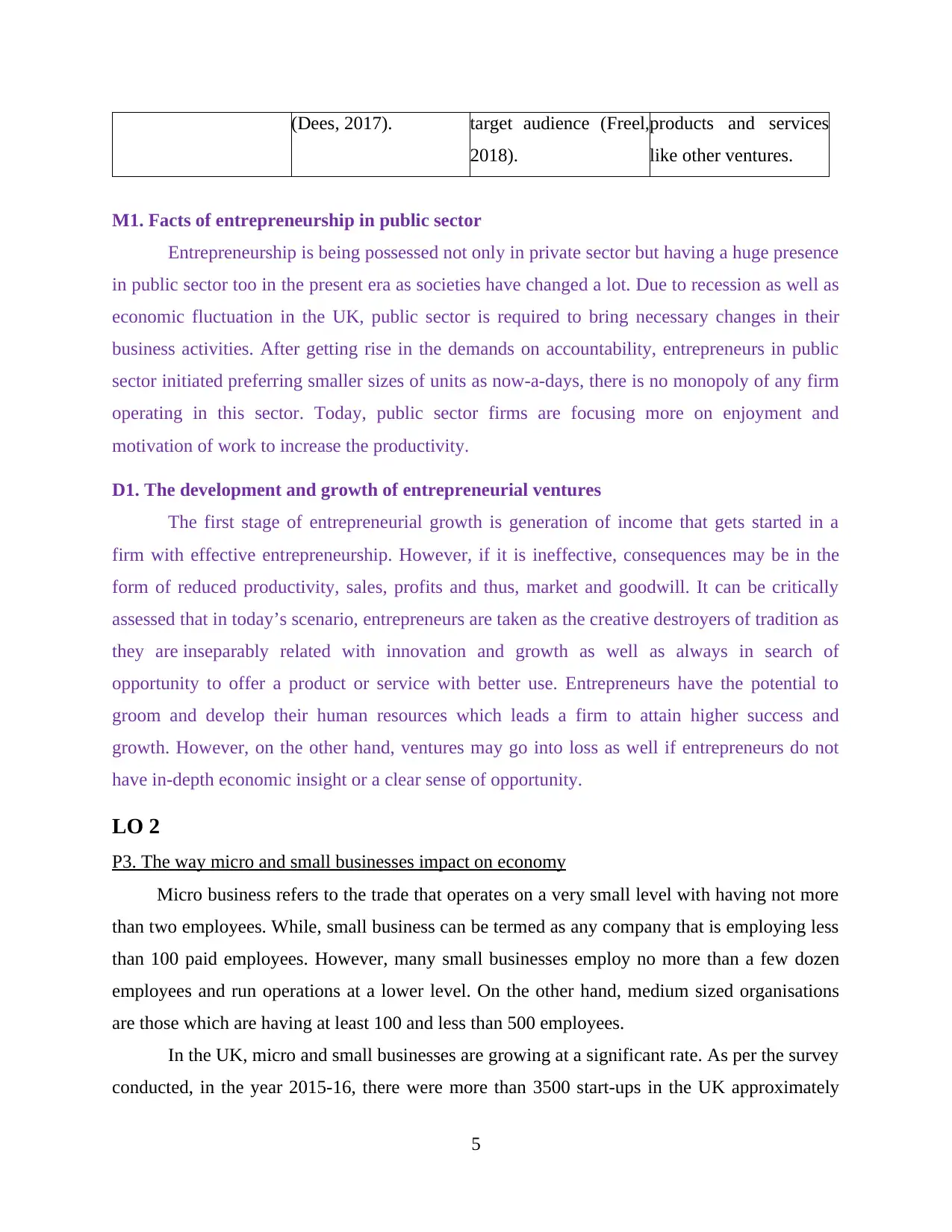
(Dees, 2017). target audience (Freel,
2018).
products and services
like other ventures.
M1. Facts of entrepreneurship in public sector
Entrepreneurship is being possessed not only in private sector but having a huge presence
in public sector too in the present era as societies have changed a lot. Due to recession as well as
economic fluctuation in the UK, public sector is required to bring necessary changes in their
business activities. After getting rise in the demands on accountability, entrepreneurs in public
sector initiated preferring smaller sizes of units as now-a-days, there is no monopoly of any firm
operating in this sector. Today, public sector firms are focusing more on enjoyment and
motivation of work to increase the productivity.
D1. The development and growth of entrepreneurial ventures
The first stage of entrepreneurial growth is generation of income that gets started in a
firm with effective entrepreneurship. However, if it is ineffective, consequences may be in the
form of reduced productivity, sales, profits and thus, market and goodwill. It can be critically
assessed that in today’s scenario, entrepreneurs are taken as the creative destroyers of tradition as
they are inseparably related with innovation and growth as well as always in search of
opportunity to offer a product or service with better use. Entrepreneurs have the potential to
groom and develop their human resources which leads a firm to attain higher success and
growth. However, on the other hand, ventures may go into loss as well if entrepreneurs do not
have in-depth economic insight or a clear sense of opportunity.
LO 2
P3. The way micro and small businesses impact on economy
Micro business refers to the trade that operates on a very small level with having not more
than two employees. While, small business can be termed as any company that is employing less
than 100 paid employees. However, many small businesses employ no more than a few dozen
employees and run operations at a lower level. On the other hand, medium sized organisations
are those which are having at least 100 and less than 500 employees.
In the UK, micro and small businesses are growing at a significant rate. As per the survey
conducted, in the year 2015-16, there were more than 3500 start-ups in the UK approximately
5
2018).
products and services
like other ventures.
M1. Facts of entrepreneurship in public sector
Entrepreneurship is being possessed not only in private sector but having a huge presence
in public sector too in the present era as societies have changed a lot. Due to recession as well as
economic fluctuation in the UK, public sector is required to bring necessary changes in their
business activities. After getting rise in the demands on accountability, entrepreneurs in public
sector initiated preferring smaller sizes of units as now-a-days, there is no monopoly of any firm
operating in this sector. Today, public sector firms are focusing more on enjoyment and
motivation of work to increase the productivity.
D1. The development and growth of entrepreneurial ventures
The first stage of entrepreneurial growth is generation of income that gets started in a
firm with effective entrepreneurship. However, if it is ineffective, consequences may be in the
form of reduced productivity, sales, profits and thus, market and goodwill. It can be critically
assessed that in today’s scenario, entrepreneurs are taken as the creative destroyers of tradition as
they are inseparably related with innovation and growth as well as always in search of
opportunity to offer a product or service with better use. Entrepreneurs have the potential to
groom and develop their human resources which leads a firm to attain higher success and
growth. However, on the other hand, ventures may go into loss as well if entrepreneurs do not
have in-depth economic insight or a clear sense of opportunity.
LO 2
P3. The way micro and small businesses impact on economy
Micro business refers to the trade that operates on a very small level with having not more
than two employees. While, small business can be termed as any company that is employing less
than 100 paid employees. However, many small businesses employ no more than a few dozen
employees and run operations at a lower level. On the other hand, medium sized organisations
are those which are having at least 100 and less than 500 employees.
In the UK, micro and small businesses are growing at a significant rate. As per the survey
conducted, in the year 2015-16, there were more than 3500 start-ups in the UK approximately
5
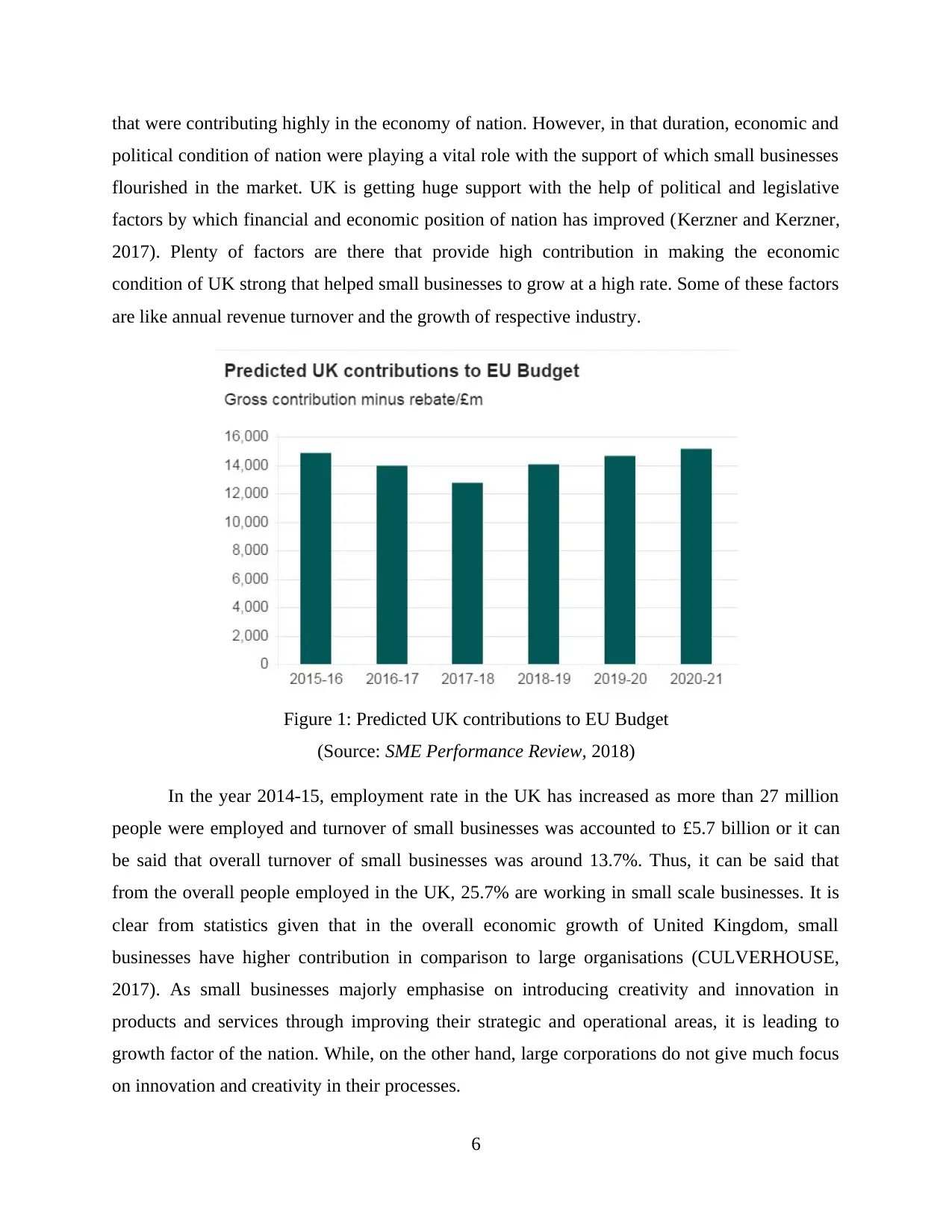
that were contributing highly in the economy of nation. However, in that duration, economic and
political condition of nation were playing a vital role with the support of which small businesses
flourished in the market. UK is getting huge support with the help of political and legislative
factors by which financial and economic position of nation has improved (Kerzner and Kerzner,
2017). Plenty of factors are there that provide high contribution in making the economic
condition of UK strong that helped small businesses to grow at a high rate. Some of these factors
are like annual revenue turnover and the growth of respective industry.
Figure 1: Predicted UK contributions to EU Budget
(Source: SME Performance Review, 2018)
In the year 2014-15, employment rate in the UK has increased as more than 27 million
people were employed and turnover of small businesses was accounted to £5.7 billion or it can
be said that overall turnover of small businesses was around 13.7%. Thus, it can be said that
from the overall people employed in the UK, 25.7% are working in small scale businesses. It is
clear from statistics given that in the overall economic growth of United Kingdom, small
businesses have higher contribution in comparison to large organisations (CULVERHOUSE,
2017). As small businesses majorly emphasise on introducing creativity and innovation in
products and services through improving their strategic and operational areas, it is leading to
growth factor of the nation. While, on the other hand, large corporations do not give much focus
on innovation and creativity in their processes.
6
political condition of nation were playing a vital role with the support of which small businesses
flourished in the market. UK is getting huge support with the help of political and legislative
factors by which financial and economic position of nation has improved (Kerzner and Kerzner,
2017). Plenty of factors are there that provide high contribution in making the economic
condition of UK strong that helped small businesses to grow at a high rate. Some of these factors
are like annual revenue turnover and the growth of respective industry.
Figure 1: Predicted UK contributions to EU Budget
(Source: SME Performance Review, 2018)
In the year 2014-15, employment rate in the UK has increased as more than 27 million
people were employed and turnover of small businesses was accounted to £5.7 billion or it can
be said that overall turnover of small businesses was around 13.7%. Thus, it can be said that
from the overall people employed in the UK, 25.7% are working in small scale businesses. It is
clear from statistics given that in the overall economic growth of United Kingdom, small
businesses have higher contribution in comparison to large organisations (CULVERHOUSE,
2017). As small businesses majorly emphasise on introducing creativity and innovation in
products and services through improving their strategic and operational areas, it is leading to
growth factor of the nation. While, on the other hand, large corporations do not give much focus
on innovation and creativity in their processes.
6
⊘ This is a preview!⊘
Do you want full access?
Subscribe today to unlock all pages.

Trusted by 1+ million students worldwide
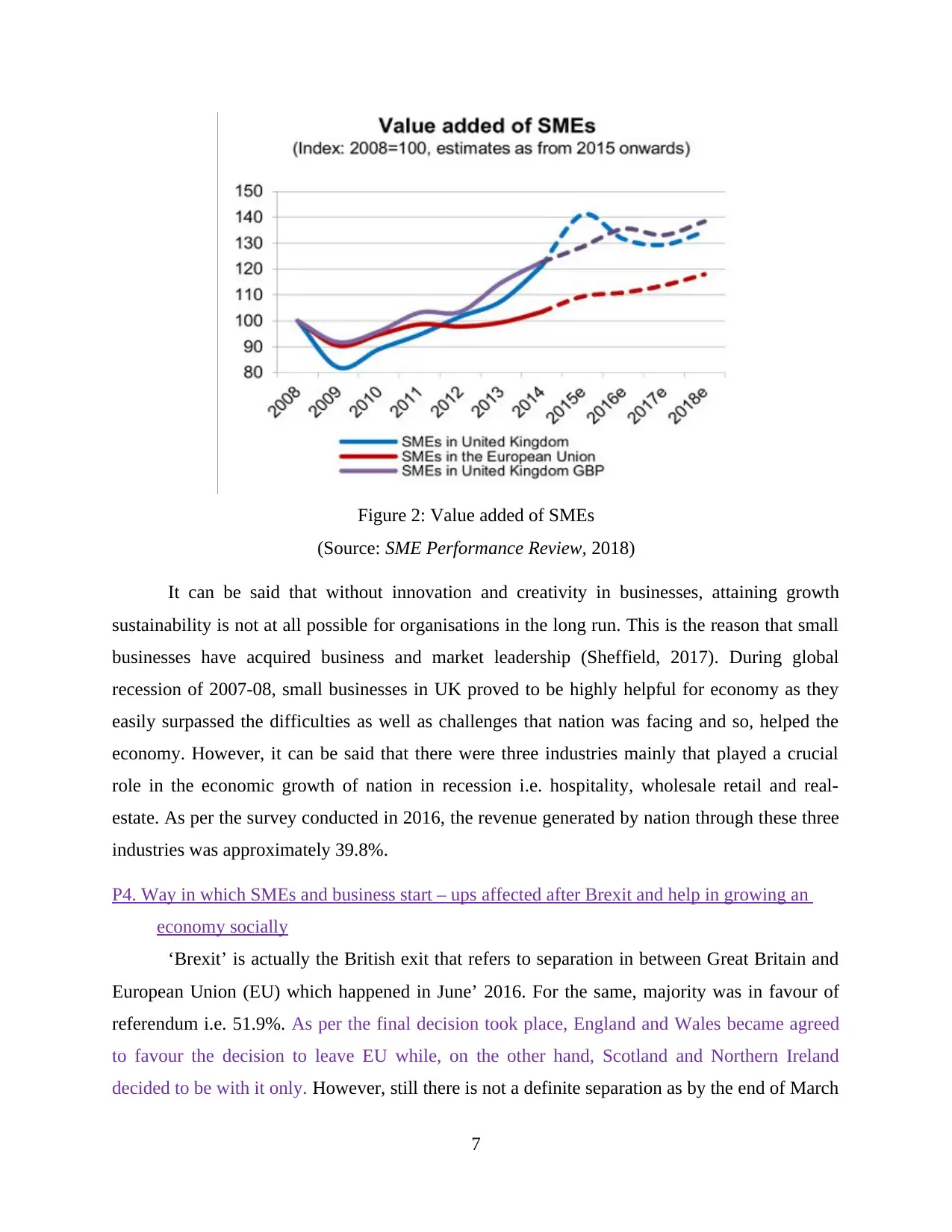
Figure 2: Value added of SMEs
(Source: SME Performance Review, 2018)
It can be said that without innovation and creativity in businesses, attaining growth
sustainability is not at all possible for organisations in the long run. This is the reason that small
businesses have acquired business and market leadership (Sheffield, 2017). During global
recession of 2007-08, small businesses in UK proved to be highly helpful for economy as they
easily surpassed the difficulties as well as challenges that nation was facing and so, helped the
economy. However, it can be said that there were three industries mainly that played a crucial
role in the economic growth of nation in recession i.e. hospitality, wholesale retail and real-
estate. As per the survey conducted in 2016, the revenue generated by nation through these three
industries was approximately 39.8%.
P4. Way in which SMEs and business start – ups affected after Brexit and help in growing an
economy socially
‘Brexit’ is actually the British exit that refers to separation in between Great Britain and
European Union (EU) which happened in June’ 2016. For the same, majority was in favour of
referendum i.e. 51.9%. As per the final decision took place, England and Wales became agreed
to favour the decision to leave EU while, on the other hand, Scotland and Northern Ireland
decided to be with it only. However, still there is not a definite separation as by the end of March
7
(Source: SME Performance Review, 2018)
It can be said that without innovation and creativity in businesses, attaining growth
sustainability is not at all possible for organisations in the long run. This is the reason that small
businesses have acquired business and market leadership (Sheffield, 2017). During global
recession of 2007-08, small businesses in UK proved to be highly helpful for economy as they
easily surpassed the difficulties as well as challenges that nation was facing and so, helped the
economy. However, it can be said that there were three industries mainly that played a crucial
role in the economic growth of nation in recession i.e. hospitality, wholesale retail and real-
estate. As per the survey conducted in 2016, the revenue generated by nation through these three
industries was approximately 39.8%.
P4. Way in which SMEs and business start – ups affected after Brexit and help in growing an
economy socially
‘Brexit’ is actually the British exit that refers to separation in between Great Britain and
European Union (EU) which happened in June’ 2016. For the same, majority was in favour of
referendum i.e. 51.9%. As per the final decision took place, England and Wales became agreed
to favour the decision to leave EU while, on the other hand, Scotland and Northern Ireland
decided to be with it only. However, still there is not a definite separation as by the end of March
7
Paraphrase This Document
Need a fresh take? Get an instant paraphrase of this document with our AI Paraphraser
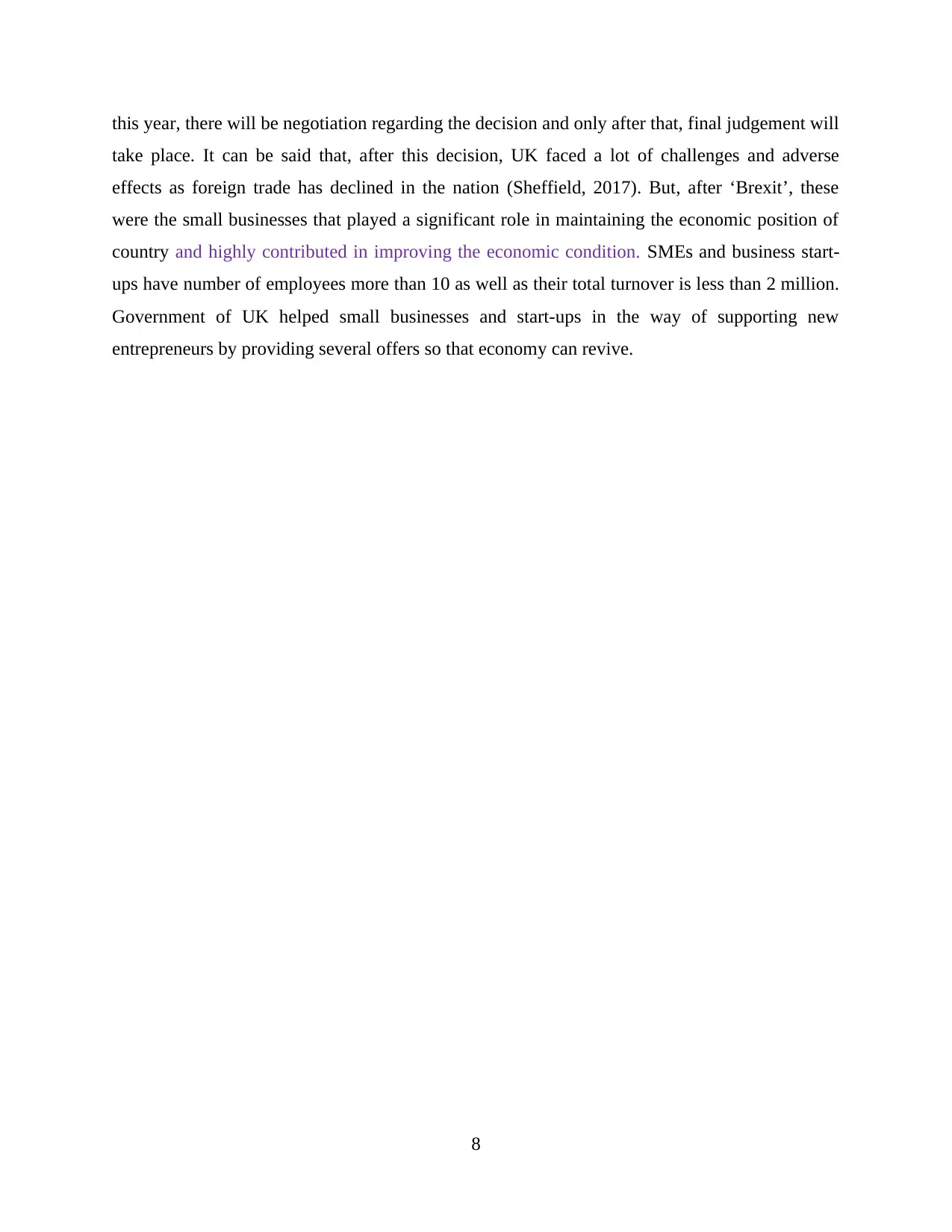
this year, there will be negotiation regarding the decision and only after that, final judgement will
take place. It can be said that, after this decision, UK faced a lot of challenges and adverse
effects as foreign trade has declined in the nation (Sheffield, 2017). But, after ‘Brexit’, these
were the small businesses that played a significant role in maintaining the economic position of
country and highly contributed in improving the economic condition. SMEs and business start-
ups have number of employees more than 10 as well as their total turnover is less than 2 million.
Government of UK helped small businesses and start-ups in the way of supporting new
entrepreneurs by providing several offers so that economy can revive.
8
take place. It can be said that, after this decision, UK faced a lot of challenges and adverse
effects as foreign trade has declined in the nation (Sheffield, 2017). But, after ‘Brexit’, these
were the small businesses that played a significant role in maintaining the economic position of
country and highly contributed in improving the economic condition. SMEs and business start-
ups have number of employees more than 10 as well as their total turnover is less than 2 million.
Government of UK helped small businesses and start-ups in the way of supporting new
entrepreneurs by providing several offers so that economy can revive.
8
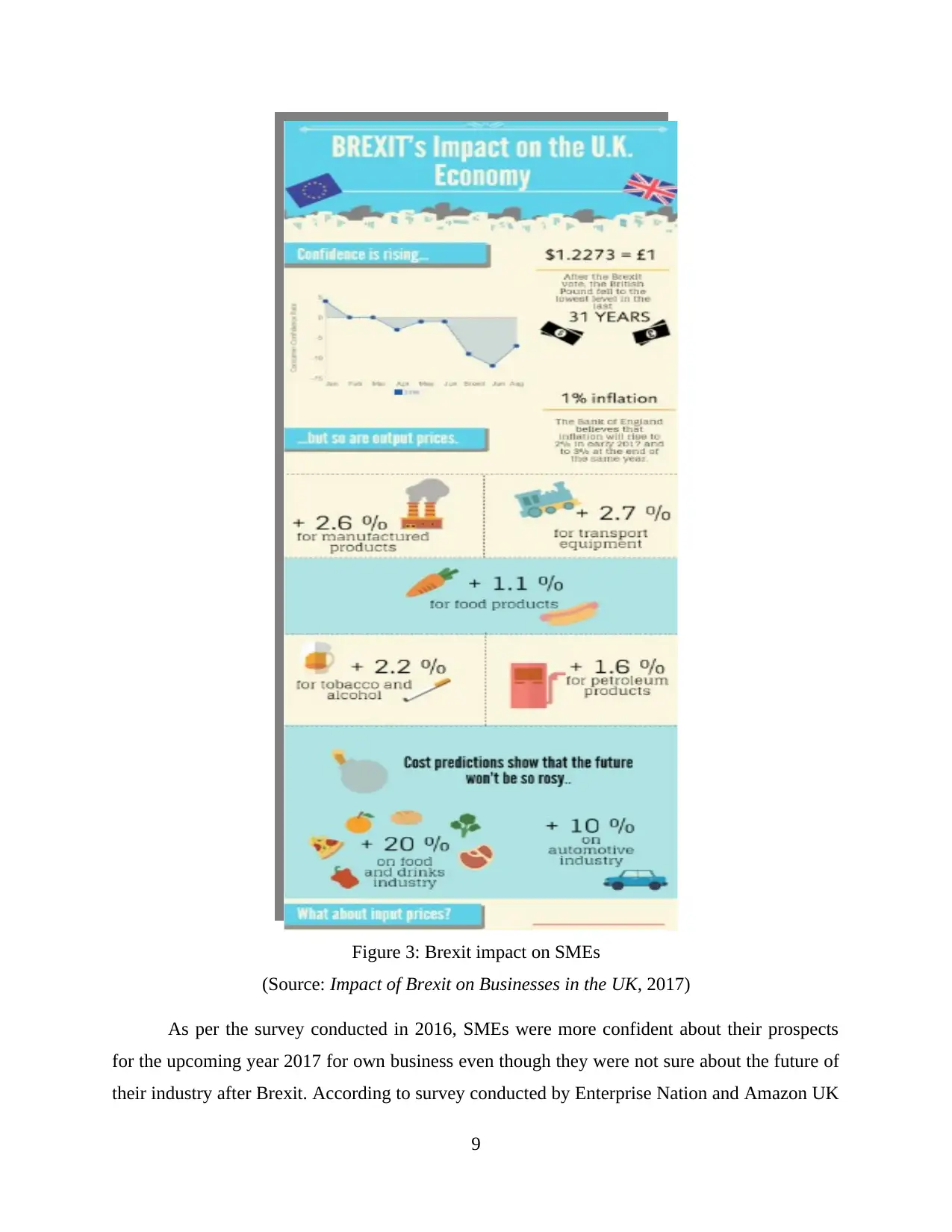
Figure 3: Brexit impact on SMEs
(Source: Impact of Brexit on Businesses in the UK, 2017)
As per the survey conducted in 2016, SMEs were more confident about their prospects
for the upcoming year 2017 for own business even though they were not sure about the future of
their industry after Brexit. According to survey conducted by Enterprise Nation and Amazon UK
9
(Source: Impact of Brexit on Businesses in the UK, 2017)
As per the survey conducted in 2016, SMEs were more confident about their prospects
for the upcoming year 2017 for own business even though they were not sure about the future of
their industry after Brexit. According to survey conducted by Enterprise Nation and Amazon UK
9
⊘ This is a preview!⊘
Do you want full access?
Subscribe today to unlock all pages.

Trusted by 1+ million students worldwide
1 out of 22
Related Documents
Your All-in-One AI-Powered Toolkit for Academic Success.
+13062052269
info@desklib.com
Available 24*7 on WhatsApp / Email
![[object Object]](/_next/static/media/star-bottom.7253800d.svg)
Unlock your academic potential
Copyright © 2020–2025 A2Z Services. All Rights Reserved. Developed and managed by ZUCOL.




